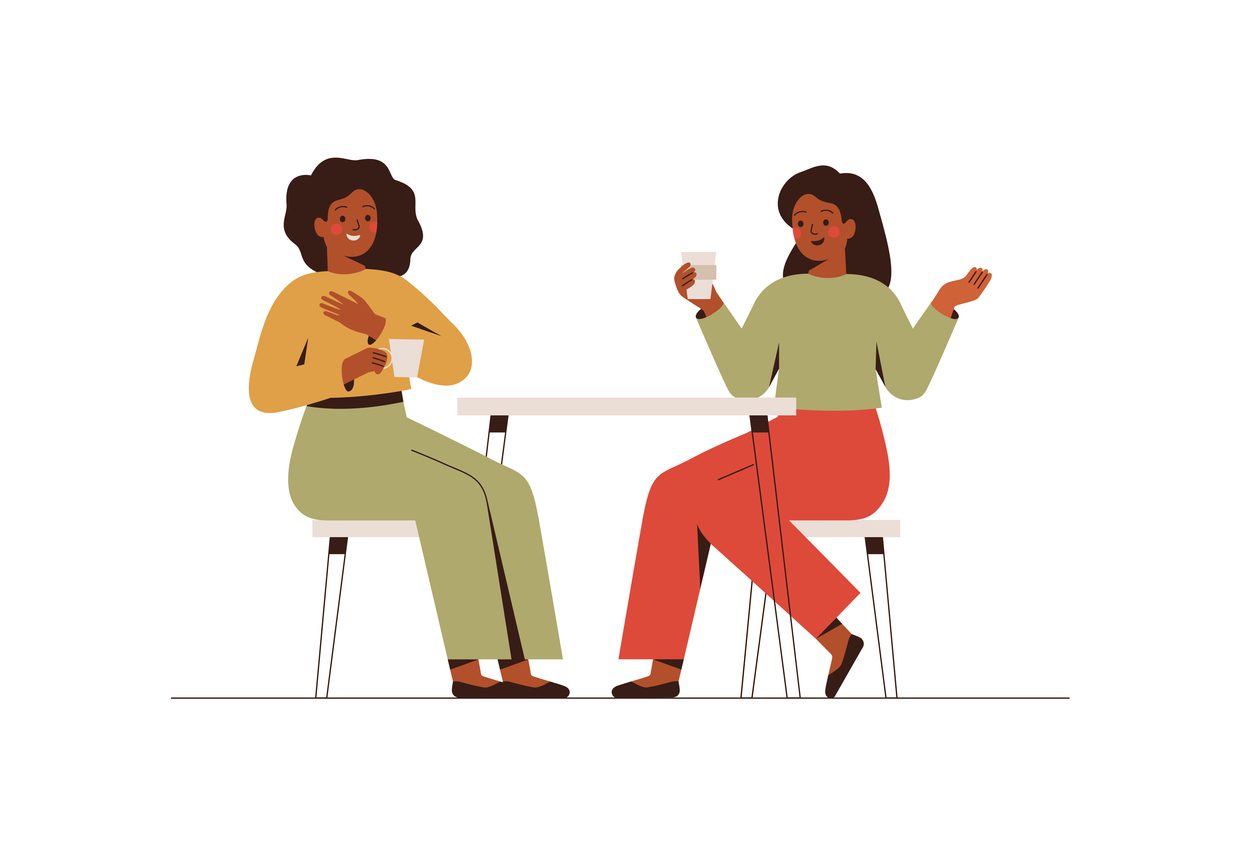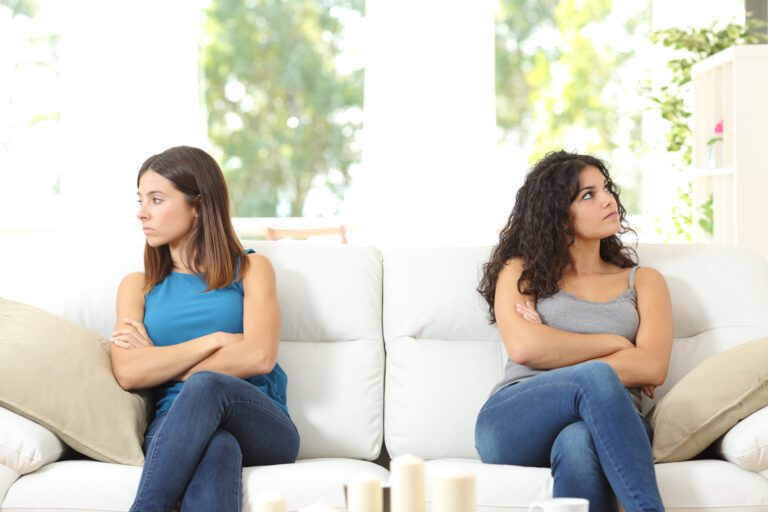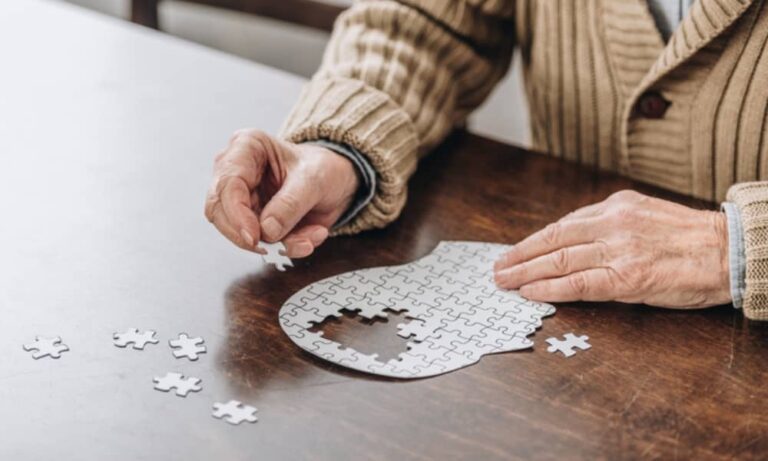There’s nothing like lockdown to make you miss your local barista’s friendly face, and the little lift you get when he greets you by name and knows your order. Research suggests that the importance of these ‘weak ties’ or people we consider acquaintances in our lives – as well as chitchat with strangers – provides a sense of belonging, community, connection and an antidote for loneliness.
The lack of these interactions have been felt by many across New Zealand and Australia as lockdowns continue, highlighting the previously underestimated importance of small talk. Sociologists refer to relationships with close family and friends as strong ties and those with casual acquaintances as weak ties.
Your weak ties may be someone from a different department at work, someone you chat to at yoga on a Monday night, or a neighbour you bump into in the supermarket. It’s estimated that we interact with somewhere between 11 and 16 weak ties as we go about our usual (non-lockdown) day, such as doing the school run, commuting, undertaking leisure activities, running errands or shopping.
A 2014 research paper titled ‘Social Interactions and Wellbeing – The Surprising Power of “Weak Ties”’ found that social and emotional wellbeing is related not only to interactions with strong ties but also to interactions with weak social ties, showing that when people had more conversations with others, they reported being happier. A 2013 study by Sandstrom and Dunn found participants who treated a service provider such as a barista like a weak tie by smiling, making eye contact and having genuine social interaction, felt 17 per cent happier and more socially connected that those who did not.
“A lot of our health and wellbeing comes from feeling we are part of a supportive larger group,’’ says Associate Professor Fiona Barlow from the school of psychology at the University of Queensland. “What the literature suggests is in fact that everyday positive and pleasant interactions with people we only know incidentally, or people who we may not get deep and meaningful with, can actually have a really positive effect in terms of how we feel,’’ she adds.
Which is why we miss the cheery hello from John from Accounts and a brief word with the lady from yoga whose name you don’t know but whose family and dog you know all about. And why does it feel so good that your barista knows your order by heart, greets you by name and asks about your holiday plans that you mentioned to him last week? “It makes you feel special, it makes you feel cared for, it makes you feel part of a community and we love that and we need that,’’ says Associate Professor Barlow.
Stranger danger
There is little doubt that in smaller regional towns and villages, it’s likely that striking up a conversation or attempting to engage a service provider in a social interaction will be viewed more favourably than in a bigger city. Not talking to strangers has, in places, become a cultural norm, but would the reaction be as bad as we tend to anticipate?
A 2014 study by Epley and Schroeder found bus and train commuters in Chicago enjoyed talking to fellow passengers more than they expected. They also found that despite participants’ concerns about being rejected, they almost never were.
A 2020 research paper by Sandstrom and Boothby titled, ‘Why do people avoid talking to strangers? A mini meta-analysis of predicted fears and actual experiences talking to a stranger’, found that people’s fears of talking to strangers were largely unfounded, and that conversations often went better than expected. The major fears included predicted low conversational enjoyment, not liking the person, not being liked, and concerns about conversational ability.
Limiting beliefs
“We carry around so many limiting beliefs about ourselves, about other people, about the situation and about what’s possible,’’ says Georgie Nightingall, founder of Trigger Conversations in London, UK – an organisation that runs workshops promising to make conversation your superpower, by teaching the lost art of conversation, connection and curiosity.
Nightingall says, “Because of those limited beliefs, e.g. ‘I’m not an interesting person, I can’t talk about myself in the situation, the person doesn’t look like me, we are different in some ways’, those things are going off in our mind, which stops us from even trying, stops us testing the feedback loop. I think we are the ones often holding ourselves back.” It’s a common complaint to hear that someone doesn’t care for small talk, but they could just be viewing it in the wrong way, says Nightingall.
“I came from a very similar place. I had a massive distaste for small talk. The events I originally ran had ‘conversation menus’ that banished small talk. I realised more and more that it’s a social code. The challenging thing with small talk is people get stuck in it, they think this is the conversation, when actually it’s just the gateway. It is the universal acceptable entry point in, and the idea of it is to set safety, build trust, get information and then use that information to go elsewhere.
Urban sociologist Ray Oldenburg defined a ‘third place’ in his book, The Great Good Place. Our first place is home, our second place is where we spend significant time in a formal setting, such as work or school, and our third place is where we go to feel part of the community.
He describes third places as having certain characteristics, including not requiring membership, being on neutral ground, social levellers, places of comfort and conversation, accessible, and feeling like a home away from home. This could be churches, cafés, clubs, public libraries or parks.
Do you have a ‘third place’?
“We are social beings, we like to be stimulated and interact. Third places provide that ad hoc opportunity,’’ says Dr Rebecca Kiddle, senior lecturer at the School of Architecture, University of Wellington and lead researcher on the third place study titled ‘Where do we dance?’ The project explored where New Zealanders create connections and build communities and what people considered their third places.
The inspiration for the project came after Dr Kiddle returned home from living in China and the UK where she found third places to be more obvious. In the UK it was the local pub, and in China people would routinely dance in the streets, says Dr Kiddle. “In China when dusk would fall, all these people would congregate on the streets and start dancing for exercise. And I learnt from my Chinese friends that was where people built community essentially, so they would gossip, exercise and dance and so on.
The streets were vital and exciting. Then I got back to New Zealand and thought, ‘Where does this happen? Where are our third places?’ There are actually no third places in some of the new suburbs. People talked about beaches being a third place, sports clubs, the school gates and Bunnings were talked about – but they excluded some groups of people.’’
The importance of third places has been shown to be wide reaching, including being vital for sustaining social capital, which is in turn important for economic capital. Social capital is defined as the networks of relationships among people who live and work in a society that enable that society to function effectively.
“There is a relationship between knowing people and economic outcomes, particularly if you know people beyond your immediate community,” says Dr Kiddle. “They are important for knowledge exchange and place attachment. Good places or good cities are places that people feel attached to. They like them, they like hanging out in them, it gives them a sense of identity.’’
The digital age and the fact that groups and clubs are less of a central focal point in our social lives than before has stopped us talking to weak ties and strangers as frequently. “Mending our frayed social capital is key to preserving the fabric of our society,’’ writes Robert D. Putnam in the 2020 edition of his book, Bowling Alone: The Collapse and Revival of American Community.
In the book, he talks about how our changing behaviour has made us increasingly disconnected and how the internet, which has introduced unthinkable opportunities for social connection, has also aided unprecedented levels of alienation and isolation. Loneliness has reached record levels globally and its damaging effects on health have been widely researched.
With social connection now understood to be a top predictor of life satisfaction, talking to each other has become more important than ever.
READ MORE: 6 Tips for how to initiate conversations with strangers







